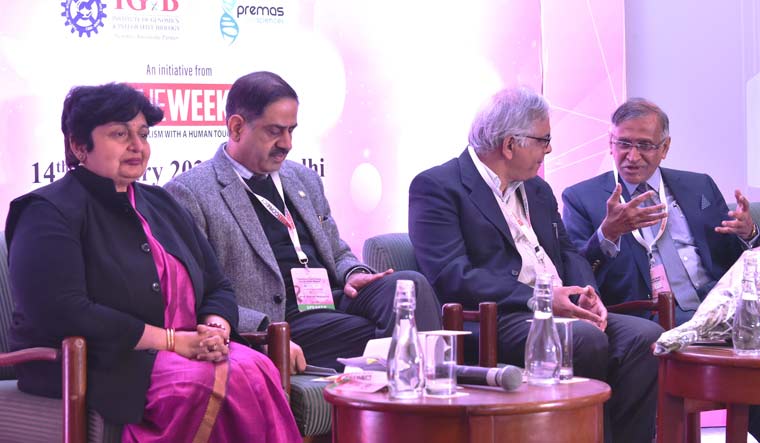Catch the disease early. In a country where one woman dies of breast cancer every 13 minutes, early diagnosis is the only way to change the grim story of the suffering and mortality due to breast cancer, top experts from the Union ministry of health and family welfare highlighted at a seminar organised by THE WEEK at the India Habitat Centre in New Delhi.
At the inaugural session, R. Prasannan, chief of bureau, THE WEEK, Delhi, set the tone for the event by quoting the high incidence and mortality rates due to the disease. “Every four minutes, one woman in India is diagnosed of breast cancer. Every 13 minutes, one woman dies due to breast cancer. Seventy-five thousand women die each year because the cancer in their breast is detected at stage 3. Deaths due to breast cancer are avoidable if the disease is detected early,” said Prasannan.
The low survival rates for breast cancer patients (50-60 per cent) were “embarrassing” for a country that aimed to be the leading economy of the world, said Dr Shekhar Mande, secretary, department of scientific and industrial research, director general, Council for Scientific and Industrial Research. Mande said the centre would be undertaking a large scale genomic sequencing project that would help in controlling diseases that affect the Indian population.
Speaking on the theme of 'Expanding breast cancer care for women in India', Preeti Sudan, secretary, Union ministry of health and family welfare, said no woman should die of breast cancer. The government had screened 92 lakh women in India for breast cancer at the health and wellness centres under Ayushman Bharat, she said. “Of these, 29,820 women have been diagnosed with breast cancer, and 17,108 were already undergoing treatment,” Sudan told an audience of doctors, scientists, researchers, students and mediapersons. Sudan, who said her mother was diagnosed with breast cancer at the age of 70 — and recovered fully — emphasised that women should be made aware of symptoms of the disease and report it early. “Though she was aware of it, my mother hid it from us. Women in India tend to hide the disease. They should report the slightest inconvenience,” she said.
To address the growing burden of cancer in India, Sudan said 20 tertiary care centres had been approved, 18 state cancer institutes had been set-up and work was on to strengthen medical colleges. “I urge everyone to visit the newly set-up National Cancer Institute in Jhajjar, where the latest equipment for cancer treatment is available,” she said. Under the Ayushman Bharat-PMJAY, the government was also providing 150 oncology packages to make treatment affordable for the needy.
Dr Balram Bhargava, secretary, department of health research, and director general of ICMR said the government had embarked on an ambitious programme to screen for non-communicable diseases through the planned 1.5 lakh health and wellness centres. However, Bhargava cautioned that despite screening for a disease such as cancer, one could still end up sick. “You may test negative for a disease today, but tomorrow you may have that disease, such is the nature of biological systems such as the human body,” he said. Bhargava too emphasised on the importance of breast self examination to catch the disease early. “Though the incidence of breast cancer in Indian women is 1/3rd of that in the West, the numbers diagnosed in our country, the numbers diagnosed early are much lower,” he said. Younger, pre-menopausal women, particularly needed to be more alert because their cancers were less receptive to latest treatments and more aggressive than in the post menopausal women.
Breast cancer cases in India had doubled since 1990, the department of health research had found through several cancer registries across the country, Bhargava told the audience. “Affordability remains a key issue in our country. Treatment with a new drug such as Herceptin which was giving excellent results in advanced breast cancers, for instance, costs Rs. 10-12 lakhs per year. The government is providing Rs. 5 lakhs under Ayushman Bharat-PMJAY. But the war has to be fought by taking preventive measures, early diagnosis and doing breast self examination once a month,” he said.



